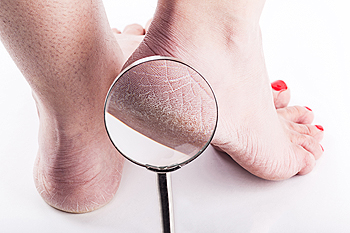 Winter can bring on many ailments, including skin on the heels that split, which is often referred to as cracked heels. Typically, this originates from dry skin, and the cold weather may cause the skin to lose moisture. If this is coupled with other conditions, such as diabetes or circulation issues, the results may lead to developing cracked heels. There are several symptoms of this ailment, often including itching, and the skin becoming thick and possibly flaking. If the fissures, or cracks, in the skin become severe, the possibility of an infection may occur. Prevention of this condition can consist of utilizing a moisturizer on your feet while paying extra attention when applying cream to the heels. Recent research has suggested that eating a diet consisting of fruits and vegetables may help to prevent cracked heels from the inside out. Please consider a consultation with a podiatrist if you have cracked heels and would like additional information.
Winter can bring on many ailments, including skin on the heels that split, which is often referred to as cracked heels. Typically, this originates from dry skin, and the cold weather may cause the skin to lose moisture. If this is coupled with other conditions, such as diabetes or circulation issues, the results may lead to developing cracked heels. There are several symptoms of this ailment, often including itching, and the skin becoming thick and possibly flaking. If the fissures, or cracks, in the skin become severe, the possibility of an infection may occur. Prevention of this condition can consist of utilizing a moisturizer on your feet while paying extra attention when applying cream to the heels. Recent research has suggested that eating a diet consisting of fruits and vegetables may help to prevent cracked heels from the inside out. Please consider a consultation with a podiatrist if you have cracked heels and would like additional information.
Cracked heels are unsightly and can cause further damage to your shoes and feet. If you have any concerns, contact one of our podiatrists from Sutera and Jones Surgical Podiatry. Our doctors can provide the care you need to keep you pain-free and on your feet.
Cracked Heels
Cracked heels appear unappealing and can make it harder for you walk around in sandals. Aside from looking unpleasant, cracked heels can also tear stockings, socks, and wear out your shoes. There are several methods to help restore a cracked heel and prevent further damage.
How Do You Get Them?
Dry skin is the number one culprit in creating cracked heels. Many athletes, walkers, joggers, and even swimmers suffer from cracked heels. Age and skin oil production play a role to getting cracked heels as well.
Promote Healing
Over the counter medicines can help, especially for those that need instant relief or who suffer from chronic dry feet.
Wear Socks – Wearing socks with medicated creams helps lock in moisture.
Moisturizers – Applying both day and night will help alleviate dryness which causes cracking.
Pumice Stones – These exfoliate and remove dead skin, which allows for smoother moisturizer application and better absorption into the skin.
Change in Diet
Eating healthy with a well-balanced diet will give the skin a fresh and radiant look. Your body responds to the kinds of food you ingest. Omega-3 fatty acids and zinc supplements can also revitalize skin tissue.
Most importantly, seek professional help if unsure how to proceed in treating cracked heels. A podiatrist will help you with any questions or information needed.
If you have any questions, please feel free to contact one of our offices located in Media and Glen Mills, PA . We offer the newest diagnostic and treatment technologies for all your foot care needs.
Read more about Solutions for Cracked Heels